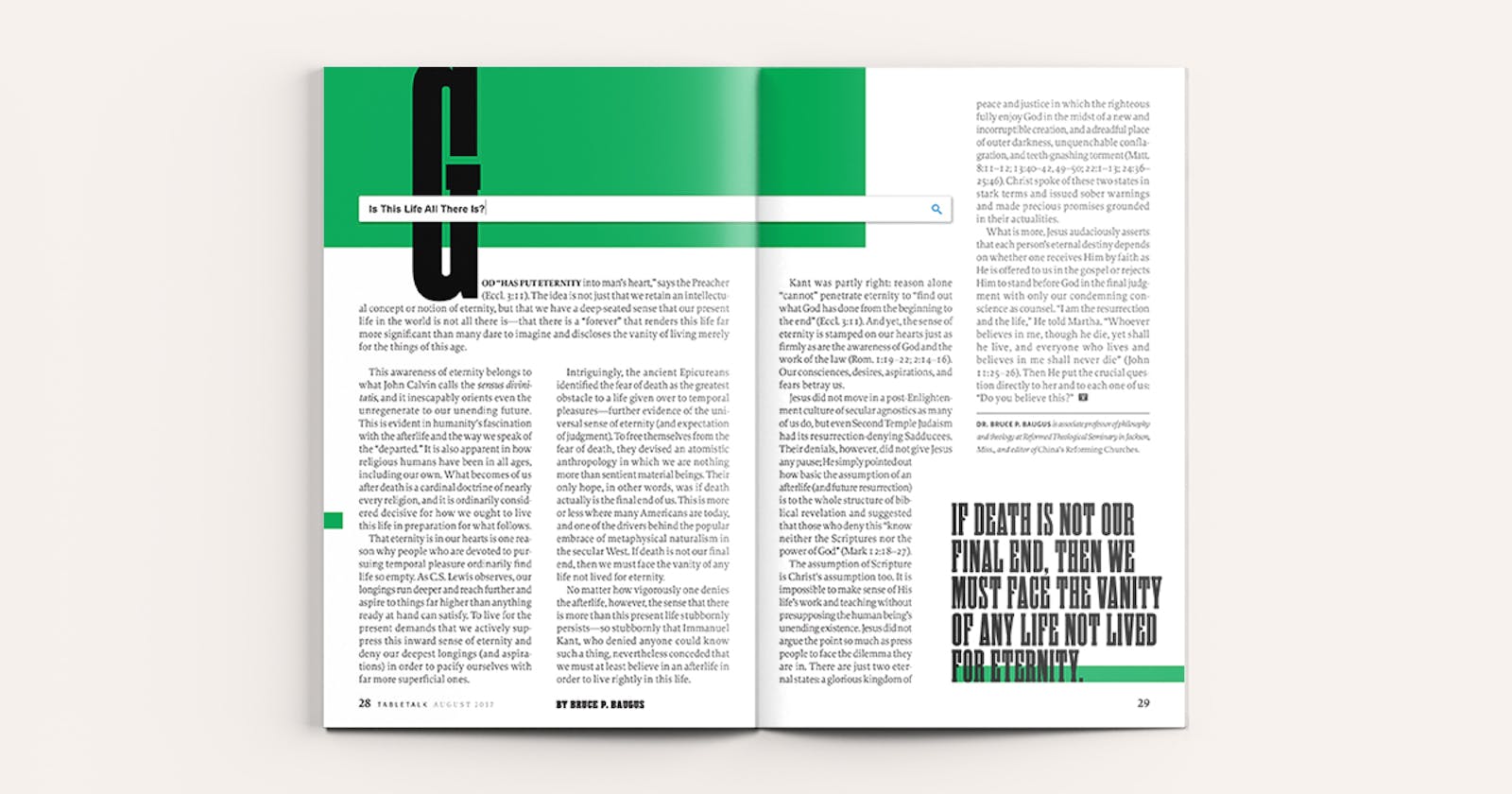
Request your free, three-month trial to Tabletalk magazine. You’ll receive the print issue monthly and gain immediate digital access to decades of archives. This trial is risk-free. No credit card required.
Try Tabletalk NowAlready receive Tabletalk magazine every month?
Verify your email address to gain unlimited access.
God “has put eternity into man’s heart,” says the Preacher (Eccl. 3:11). The idea is not just that we retain an intellectual concept or notion of eternity, but that we have a deep-seated sense that our present life in the world is not all there is—that there is a “forever” that renders this life far more significant than many dare to imagine and discloses the vanity of living merely for the things of this age.
This awareness of eternity belongs to what John Calvin calls the sensus divinitatis, and it inescapably orients even the unregenerate to our unending future. This is evident in humanity’s fascination with the afterlife and the way we speak of the “departed.” It is also apparent in how religious humans have been in all ages, including our own. What becomes of us after death is a cardinal doctrine of nearly every religion, and it is ordinarily considered decisive for how we ought to live this life in preparation for what follows.
That eternity is in our hearts is one reason why people who are devoted to pursuing temporal pleasure ordinarily find life so empty. As C.S. Lewis observes, our longings run deeper and reach further and aspire to things far higher than anything ready at hand can satisfy. To live for the present demands that we actively suppress this inward sense of eternity and deny our deepest longings (and aspirations) in order to pacify ourselves with far more superficial ones.
Intriguingly, the ancient Epicureans identified the fear of death as the greatest obstacle to a life given over to temporal pleasures—further evidence of the universal sense of eternity (and expectation of judgment). To free themselves from the fear of death, they devised an atomistic anthropology in which we are nothing more than sentient material beings. Their only hope, in other words, was if death actually is the final end of us. This is more or less where many Americans are today, and one of the drivers behind the popular embrace of metaphysical naturalism in the secular West. If death is not our final end, then we must face the vanity of any life not lived for eternity.
No matter how vigorously one denies the afterlife, however, the sense that there is more than this present life stubbornly persists—so stubbornly that Immanuel Kant, who denied anyone could know such a thing, nevertheless conceded that we must at least believe in an afterlife in order to live rightly in this life.
Kant was partly right: reason alone “cannot” penetrate eternity to “find out what God has done from the beginning to the end” (Eccl. 3:11). And yet, the sense of eternity is stamped on our hearts just as firmly as are the awareness of God and the work of the law (Rom. 1:19–22; 2:14–16). Our consciences, desires, aspirations, and fears betray us.
Jesus did not move in a post-Enlightenment culture of secular agnostics as many of us do, but even Second Temple Judaism had its resurrection-denying Sadducees. Their denials, however, did not give Jesus any pause; He simply pointed out how basic the assumption of an afterlife (and future resurrection) is to the whole structure of biblical revelation and suggested that those who deny this “know neither the Scriptures nor the power of God” (Mark 12:18–27).

The assumption of Scripture is Christ’s assumption too. It is impossible to make sense of His life’s work and teaching without presupposing the human being’s unending existence. Jesus did not argue the point so much as press people to face the dilemma they are in. There are just two eternal states: a glorious kingdom of peace and justice in which the righteous fully enjoy God in the midst of a new and incorruptible creation, and a dreadful place of outer darkness, unquenchable conflagration, and teeth-gnashing torment (Matt. 8:11–12; Matt. 13:40–42, 49–50; Matt. 22:1–13; Matt. 24:36–25:46). Christ spoke of these two states in stark terms and issued sober warnings and made precious promises grounded in their actualities.
What is more, Jesus audaciously asserts that each person’s eternal destiny depends on whether one receives Him by faith as He is offered to us in the gospel or rejects Him to stand before God in the final judgment with only our condemning conscience as counsel. “I am the resurrection and the life,” He told Martha. “Whoever believes in me, though he die, yet shall he live, and everyone who lives and believes in me shall never die” (John 11:25–26). Then He put the crucial question directly to her and to each one of us: “Do you believe this?”
